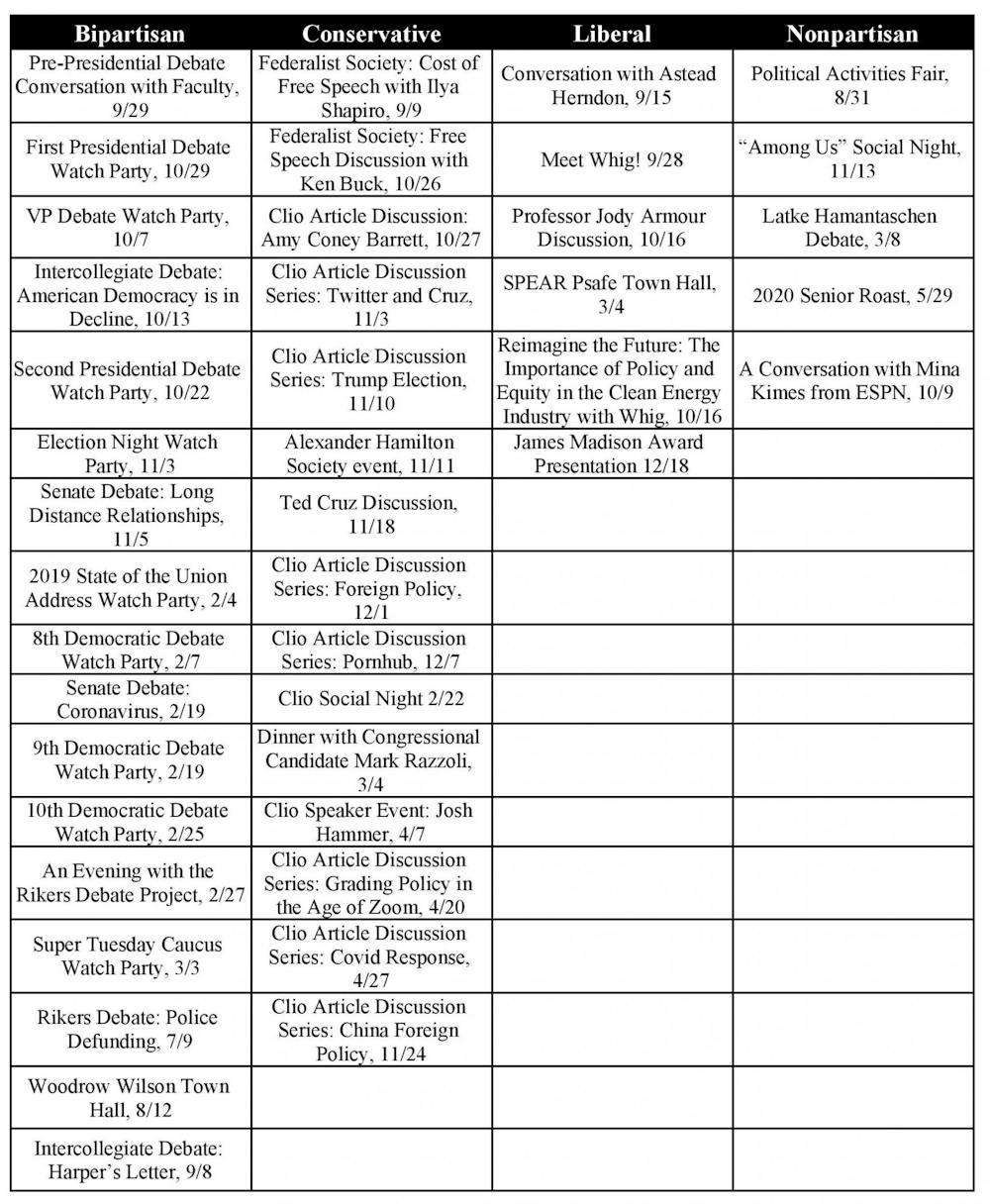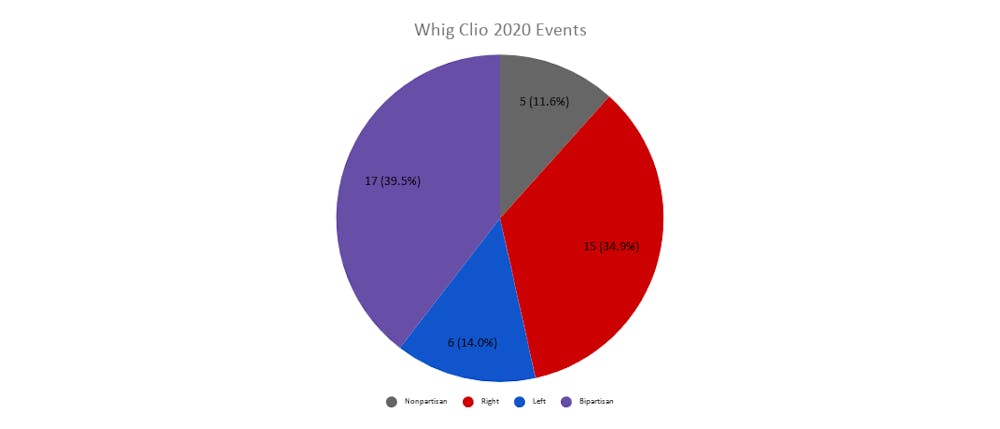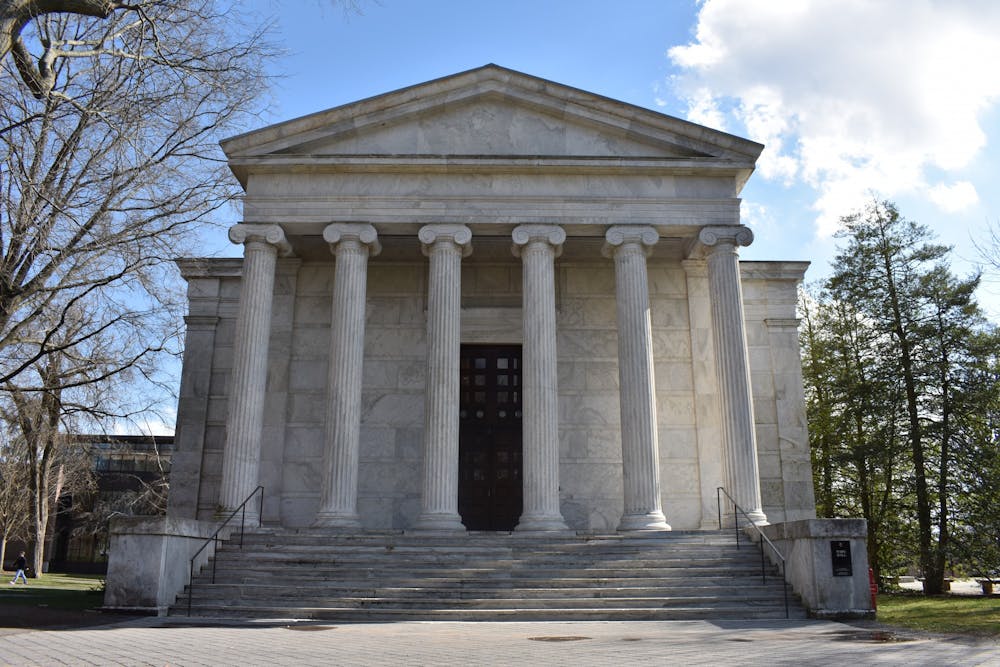On my way to take my 82-year old grandmother for her COVID-19 vaccination, I received the first notification regarding the article, “The New Strategy to Suppress Conservative Voices on Campus”. Having lost my father to COVID-19 only a few months ago, I understood the importance of making sure that my grandmother, who lives in an independent living facility, would “get the jab” as early as possible. Staying safe, celebrating life, welcoming a New Year, and praying for happier times: these are the things that I and the rest of the Whig Clio Governing Council should have been doing over our winter break.
Instead, one of our former officers decided to publish an article wrought with untruths and out-of-context assertions alleging that we were part of the “intolerant Left” and “Princeton’s political elite,” dedicated to silencing conservative voices on campus. So, the next several days were spent dealing with harassing emails and offensive messages aimed at the Governing Council and its members.
In a meeting with some Governing Council members the next day, Adam Hoffman ’23, the author of the article, offered a disheartened apology, stating that “this was not [his] intention.” Then, one might ask, “what exactly was the intent?”, especially since this same person had only weeks earlier lauded Morgan Smith ’21 (the President of Whig Clio) and me (the Vice President) for what he considered tremendous work. He even went on to express that it was an honor to work with us and how we had accomplished so much together.
But those were all sentiments expressed before he lost his election bid to become the next President of Whig Clio, the same group he vehemently and unfairly criticizes in the article. From Capitol Hill to student groups on college campuses, I suppose this is the new strategy for some: when elections do not go their way, they spread untruths and undermine credibility with little regard for the people who are harmed at the end of the day.
If one were to believe Hoffman in his article for the National Review, one might believe that hidden in the depths of Whig Hall was some insidious group of politically-left elitists plotting to suppress the voices of the right at Princeton University. Well, Adam, I am happy to report that if ever a plot existed, it failed miserably.
This past year, Whig Clio, the nation’s oldest collegiate political, literary, and debate society, continued to support our founding principles to facilitate healthy debate and encourage open and inclusive discussion. In fact, this year, by most accounts, was a success. Despite the additional hurdles presented by COVID-19 and the transition to an online platform, we experienced tremendous growth in membership. The number of “members in good standing” in Whig Clio increased by more than 70 percent, solidifying our status as one of the largest student-led groups at the University, catering to hundreds of Princeton students and their wide-ranging views on art, literature, and politics.
Notably, this growth was not confined to one party or ideology. In fact, the right-leaning Cliosophic Party actually quadrupled in size. This year, Whig Clio hosted 43 events — a testament to the hard work and dedication of the entire Governing Council. Of those events, five were non-partisan, 17 were bipartisan, six were left-leaning, and 15 were right-leaning. We also hosted 10 speaker events. Of the 10, one was non-partisan, three were left-leaning, and six were right-leaning. These verifiable facts do not support Hoffman’s assertions of anti-conservative bias.
In fact, most of Hoffman’s piece lacks merit, and he provides absolutely no solid evidence to support his accusations. He does, though, provide a few anecdotes that, sadly, are not reflective of reality. He claims that we unfairly and predictably blocked “[his] speakers” from receiving invitations. Ignoring the fact that inviting speakers to the society is the job of the Speakers Council and not the Clio Party Chair (Hoffman’s former role), this claim is wildly misleading. Of the 30 speakers that Hoffman proposed, we approved 26 after brief deliberation and asked for further details on two (George Will GS ’68 and Judge Neomi Rao).

Regarding George Will, meeting minutes indicate that the Governing Council voted to temporarily place the speaker’s approval on hold until Hoffman presented more details on the type of event he was proposing. As broadly discussed during the meeting, the basis of the request for a more detailed plan was not due to intolerance, but rather because of concerns that protests might disrupt the event, as was the case when Will spoke at Princeton’s 2019 baccalaureate ceremony, less than seven months prior. Moreover, as a part of the discussion around a possible invitation to Will, members offered suggestions that included hosting a private dinner or hosting a panel. The common theme of the discussions was to encourage organized disagreement rather than chaos and protests. Since early February 2020 (when the discussion and vote took place), this additional information still has not been provided by Hoffman.
Regarding Judge Neomi Rao, although the motion to invite the speaker did not receive the required number of votes to pass, this was not because she was opposed (in fact, only one member was opposed to her speaking). The majority of the Governing Council abstained after requesting additional information. Once again, since January 2020, Hoffman never followed up.
Hoffman further claims that none of the “left-leaning” party’s speakers were questioned. This is frankly untrue. Several left-leaning speakers were questioned and/or ultimately not invited to speak.
It is also important to note that the Whig Party Chair submitted a fraction (one-sixth) of the number of speakers proposed by Hoffman, recognizing that her primary responsibility was to foster a sense of community rather than “invite speakers,” which is quite different from Hoffman’s self-ascribed role. In fact, Whig-Clio’s constitution clearly explains that “The Director of Program shall be responsible for the administration of the Society’s Speaker Seminar…,” as noted in subsection C.5. of Section VII, titled “Executive Officers”. Nowhere in Hoffman’s job description was it written or inferred that he was responsible for inviting speakers. That said, the president and vice-president heartily encouraged coordination among Whig and Clio party chairs and the Director of Program to identify potential speakers for special occasions.

Hoffman charges the Governing Council with being intolerant of the right. This ignores the fact that many on the Governing Council are actually members of “the right.” He claims to fight for inclusion and free speech, but his actions as Clio Party Chair suggest otherwise. Instead of advertising all events to all members of the society, there were several instances where advertisements featuring conservative discussions were either significantly delayed or not provided in a timely manner.
Rather than have the events go unadvertised, however, we “intolerant political elites” took it upon ourselves to design and advertise the events. Apparently, we are so disgraceful that even Ted Cruz ’92 and Ilya Shapiro have chimed in after reading Hoffman’s article, noting that what we did was “for shame” and very disappointing. This is particularly ironic since we co-hosted events with each of these speakers this year. In the case of Cruz, the majority of the attendees identified as Whig (left-leaning).
Despite Whig Clio’s collective effort in hosting those events, Hoffman consistently noted during and after our Ted Cruz discussion that the talk was hosted by the Cliosophic Society. The Cliosophic Society has not existed as an organization since 1928 when it merged with Whig. This intentional and gross misrepresentation of facts is a shameful attempt to create a divide and distance the right-leaning members of our society from the larger body. The shame doesn’t end there, as Hoffman has even crafted a title for himself. He claims that he is, and is cited by the National Review as, the “President” of this Cliosophic Society — the one that hasn’t existed for nearly 100 years.
Beyond pathetic, it is disappointing and dangerous for these mischaracterizations to remain unchecked. Rather than raising these concerns in any of our weekly meetings, Hoffman waited 11 months, or perhaps strategically until after his unsuccessful bid to be elected President of Whig Clio. As a result of these blatant untruths, the Governing Council has been cast as evil, restrictive, and unfair. In the National Review, some commenters labeled us communists and Soviets, and still others claimed that we were whiny petulant protestors who are unable to engage in substantive debate.
At best, Hoffman’s article is only a case of a student reshaping reality to align with something he has heard, read about, or dreamt. Perhaps Hoffman really is sorry as he said during our recent meeting (which occurred after the article was published). Maybe, just maybe, we should all believe him when he said this wasn’t his intention. Perhaps it really was only for the sake of five minutes of fame and a few hundred retweets.
To those same readers and commenters who criticized Whig Clio after hearing only one person’s account, would a secret left-leaning cabal really host nearly 2x as many conservative events as liberal events? Is it our fault that Hoffman chose not to further explain his plan for inviting Rao and Will (it should be noted that these further explanations were also made for liberal speakers who might be viewed as “controversial” as well)? Was the Society being intolerant of the right when it awarded Hoffman a $3,000 stipend to intern at the White House under the Trump administration? Is it really fair for you all to judge us after you only heard one perspective?
If so, then I suppose “free speech” and “vigorous debate” are truly under assault on college campuses.
At the end of the proverbial day, it is important to remember that Whig Clio is a Society where students get to choose the speakers and events that are hosted. Hoffman’s successor as Clio Party Chair is well within his right to request that Rao and Will be invited to speak in the upcoming year. In the spirit of democracy however (since Hoffman suggests we reacquaint ourselves with the writings of James Madison), it is also important to reaffirm that Whig Clio is not subject to the will of one individual or any single officer. The Council should continue to choose speakers that not only meet these requirements outlined in our Protocol, but also truly add to the Speaker’s Series as a whole. They should not, however, simply invite speakers because they could, rather, it should be because it is what they want.
Lastly, as Hoffman noted in his article, the liberal to conservative speaker invite ratio at other universities can be as high as 32:1. Conveniently he left out the statistics for Whig Clio (no worries, we provide them below). So, for those who believe that we have been ostracizing conservative voices, we will let our record speak for itself. Here is a full list of Whig Clio events hosted in the past year.

Schedule courtesy of Terrell Seabrooks ’21 and Morgan Smith ’21, former Whig Clio officers

Graphic courtesy of Terrell Seabrooks ’21 and Morgan Smith ’21, former Whig Clio officers

Graphic courtesy of Terrell Seabrooks ’21 and Morgan Smith ’21, former Whig Clio officers
G. Terrell Seabrooks ’21 is the former Vice President of Whig Clio. He can be reached at gts2@princeton.edu.
Although the article was written from the perspective of Seabrooks, Morgan Smith ’21, former President of Whig Clio, signs on, agreeing with the sentiment of the words and attesting to the accuracy of the facts and stories described.
Editor’s Note: Upon initial publication, the text of this article stated that of Whig Clio’s 43 events, four were non-partisan, 19 were bipartisan, six were left-leaning, and 14 were right leaning. According to submitted data, as illustrated in the graphics above, five were non-partisan, 17 were bipartisan, 6 were left-leaning, and 15 were right-leaning. This piece was updated to resolve this inconsistency.








